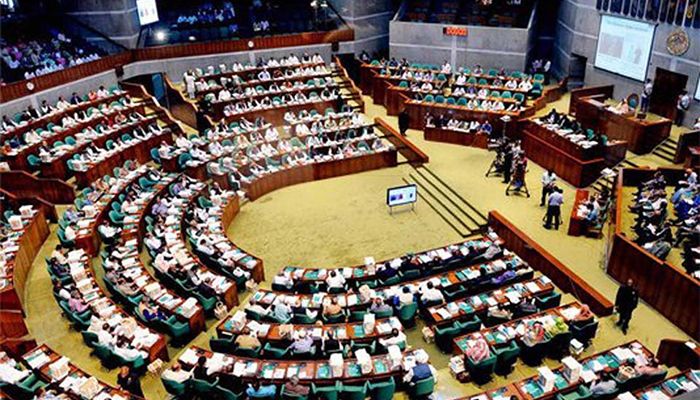
Desk Report
Publish: 05 Apr 2022, 12:54 pm

Jatiya Sangsad || Photo: Collected
A bill titled
‘Anti-Discrimination Act-2022’ today placed in the Jatiya Sangsad here to cope
with any human rights violations.
Law, Justice and Parliamentary
Affairs Minister Anisul Huq placed the bill in the House, which was sent to the
parliamentary standing committee on the respective ministry for further
scrutiny with Speaker Dr Shirin Sharmin Chaudhury in the chair.
The committee was asked to submit
its report before the parliament within 30 days.
Earlier, the Cabinet has endorsed
policy support and final approval to the draft of ‘Anti-Discrimination
Act-2022’.
The approval was given at a
cabinet meeting chaired by Prime Minister Sheikh Hasina at the Jatiya Sangsad
Bhaban, on January 17, this year.
“Inequalities have been
eliminated worldwide through a number of international conventions,” according
to the draft law. In this context, the issues of elimination of inequality have
been clearly mentioned (in the Act). This law has been brought in that light.”
A monitoring committee would be
established in the light of the law. The committee will have its presence at
various seams of the society---national, divisional, and so on.
The committee will monitor if any
violation of human rights is occurring or not, across the country. A President
will head the committee.
The Law Minister shall be the
Chairman of the Central Committee, statutorily, and a Joint Secretary hailing
from the legislative wing will be its member secretary. In this way, the
government will form such committees as it deems necessary throughout the
administrative units. The president will hold monitoring meetings at different
times, it added.
It said : “An anti-discrimination
cell will be formed. The cell will then form anti-discrimination national,
divisional, district and other committees to prevent discriminatory activities,
if any. And, it will provide immediate remedies.”
The draft law added that they
need to create awareness among the people so that no discrimination takes place
across the society.
“If anyone lodges a complaint,
the district committee will investigate the matter within 30 days,” the law
specified.
If the district committee fails
to provide proper redress, the complainant could urge the divisional committee
for an enquiry within 30 days of filing the complaint.
In case, the divisional committee
fails, the national committee will investigate and take action after 45 days.
If the aggrieved person files a case in the appropriate court, the case has to
be disposed of within 90 days. If he fails to do so within 90 days, the case
will have to be extended by a maximum of another 15 days, according to the bill.
Subscribe Shampratik Deshkal Youtube Channel
© 2024 Shampratik Deshkal All Rights Reserved. Design & Developed By Root Soft Bangladesh